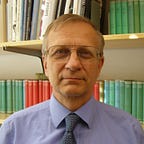The Standard Account
We have now looked at the standard account of the beginnings of Greek philosophy, which proposes three stages of development:
1. The early Ionian philosophers are (mostly) Material Monists: they propose one stuff that is the only stuff in existence in the original state of things, and which becomes differentiated into different stuffs, but always keeps its identity. For instance, Thales says that everything comes from water and even having changed its appearance into other things like earth, air, and fire, wood, and flesh, it still IS water.
2. Parmenides challenges this theory, saying there is only what-is or Being, and nothing changes.
3. Subsequent philosophers, in an attempt to save cosmology and scientific philosophy from Parmenides criticisms, propose the theory that there is a plurality of changeless stuffs, such as Empedocles’ four elements: earth, water, air, and fire. These elements do not come-to-be or perish, but they do combine with each other and separate to produce new configurations of things, like heavenly bodies and animals and human beings, which survive temporarily. These philosophers embrace Material Pluralism and are known as Pluralists.
Last time (Beginnings 2), we saw that point (1) was dubious: there is no good evidence that the early Ionian thinkers were Material Monists. More likely, they adhered to what I call the Generating Substance Theory: there is a single original stuff and is transformed into other stuffs (with which the original stuff is not identical) in a series of transformations, such that all the stuffs generated are interconnected in a series. We have, for instance, Anaximenes’ series, from the most rare to the most dense stuff:
Fire ↔ Air ↔ Wind ↔ Cloud ↔ Water ↔ Earth ↔ Stones
On this model, Air is the most basic reality, but not the only one. This theory is, no less than the post-Parmenidean theory, a pluralist theory.
Heraclitus
In this story, Heraclitus has an important role to play: he points out that the theory just sketched has a flaw. The advocates of the theory want to claim that one stuff is prior to all the others. Heraclitus objects that the logic of the theory makes it so that all the stuffs in the series are equivalent to each other. One of them might be temporally prior, in case there was a primeval state in which there was only air, or only water, for instance. But no stuff in the series is ontologically or metaphysically superior to any other, because they are, so to speak, interchangeable. Heraclitus makes Fire his special stuff. But not, I think, because it is superior to the others. Rather, it has symbolic value as the most variable and impermanent of stuffs, and hence the one that best illustrates the real implication of the theory: that what is Real is not any particular stuff but the Process itself. If, in a simple system of three stuffs (such as Heraclitus uses: Fire, Water, Earth), we have a series of transformations, then schematically: A ↔ B ↔ C. And since A, B, and C are transformationally equivalent (interchangeable), then what is Real is not A, B, or C, but (to use ‘x,’ ‘y,’ and ‘z’ as variables), x ↔ y ↔ z. What is Real is the cycle or the process, not the states of being in the process. This makes Heraclitus a “process philosopher,” but not merely that. For according to him, there is something very permanent about the process: there is a rigid law of change that governs all things. This, I take it, is in some way represented by the Logos, the Word or Message he sees in the world. Here is his most straightforward summary of his system:
This world-order [kosmos], the same of all, no god nor man did create, but it ever was and is and will be: everliving fire, kindling in measures and being quenched in measures. (Heraclitus fr. 30)
Some scholars think that Heraclitus has a world, like that of the Stoics, which is burned up in a cosmic conflagration periodically, and then regenerated. But Heraclitus says here, quite explicitly, that his cosmos ever was, is, and will be: it is everlasting — ironically, given that many commentators, both ancient and modern, say that for him everything is changing every instant. No, the point is that because fire is kindling and being quenched constantly, there is an ecological balance that continues forever. There is material flux, but a formal order, based on the law of tranformations, supervenes on this flux to make the world an orderly place. The law of change ensures continuity, and indeed the everlasting permanence of the cosmos.
Heraclitus, on this version, is an integral part of the story of early Greek philosophy. He is a lot more perceptive and philosophical than many commentors give him credit for being.
Parmenides
That brings us back to Parmenides, point (2) in the standard account. What is his role in the debate? It is a little hard to make sense of him in the standard account. Who is he arguing with? With the Material Monists? But he mostly agrees with them. It is true that his One Reality is not a material reality, not water, or air, or fire. It is Being. But in many ways he should be sympathetic to the Material Monists. He is, after all, a Monist. He, like them, wants to rule out radical change, unqualified coming-to-be. He wants to go even farther. But he at least has a large area of agreement with the Material Monists — if the earlier philosophers really are Material Monists.
